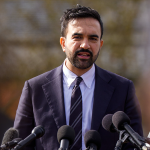PHOENIX — From the president down to county offices, Arizona ballots are nearly as long as this state’s record number of 100-degree days this year.
The White House race between Vice President Kamala Harris and her Republican rival, former President Donald Trump, leads the ballot. Both candidates and their respective running mates, Gov. Tim Walz (D-MN) and Sen. J.D. Vance (R-OH), have made numerous stops in the southwest political battleground. They often hold events in torrid heat, which culminated in a May 27-Sept. 17 streak of 113 consecutive days with temperatures above 100 degrees Fahrenheit.
Harris replaced her boss, President Joe Biden, as the Democratic nominee about halfway through that arid weather streak. Yet even before Biden, 81, stepped down after his poor June 27 debate performance against Trump, Arizona was at the center of the American political universe. In addition to the presidential fight, there’s an open Senate seat — featuring one of Trump’s highest-profile MAGA acolytes, Republican nominee Kari Lake. The Senate race will help determine which party wins a majority in the chamber.
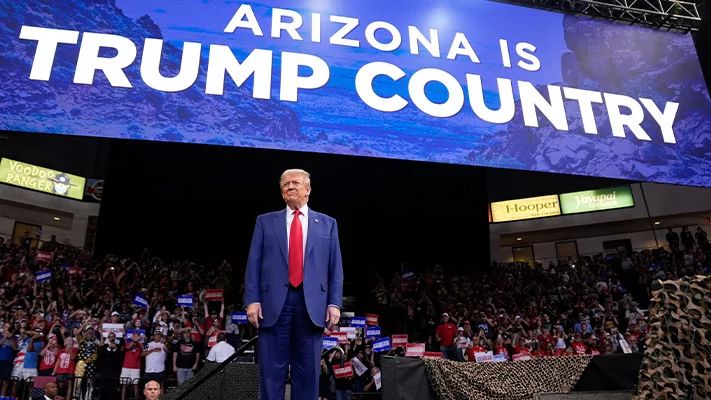
Plus, there’s a pair of competitive House races, in and around the state’s largest cities of Phoenix and Tucson, which are key to both parties’ chances at nabbing the majority. Along with those are battles to control both chambers of the state legislature; to be the top elections official in Maricopa County, a position that’s drawn scrutiny since Trump’s false claims about the 2020 election results; ballot initiatives galore; and much more.
All the ballot action makes Arizona a political microcosm of the nation. The presidential race is effectively tied nationally, as it is in Arizona. Per various polling averages, neither Harris nor Trump has opened a convincing lead outside the margin of error in Arizona and the other swing states — Georgia, Michigan, Nevada, North Carolina, Pennsylvania, and Wisconsin.
Arizona, moreover, lies at the intersection of some of America’s most urgent demographic and political trends. Including migration from colder states to the Sun Belt and a healthy dose from next door in California, the impact of immigration, the increase in Hispanic influence on politics, and problems confronting Arizona’s considerable Native American communities.
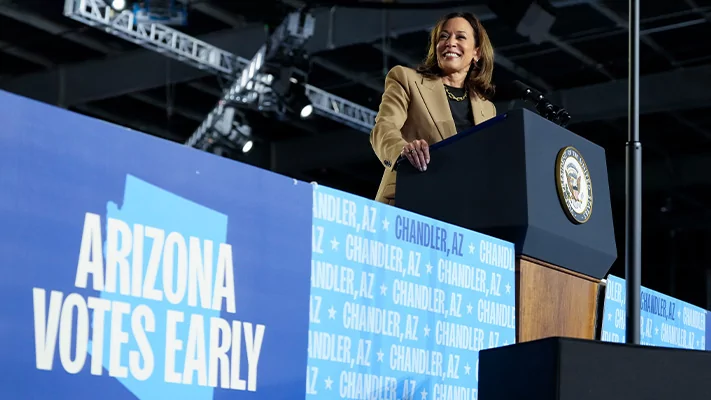
Arizona’s neck-and-neck presidential race is a relatively new phenomenon. Before Biden’s 2020 victory, Arizona had voted Democratic for president only once since 1948. Then, four years ago, Biden pulled out a narrow Arizona victory over Trump, a key element in his Electoral College majority that evicted Trump from the White House. Biden won Arizona 49.36% to 49.06%, or 10,457 votes out of nearly 3.4 million cast.
The Nov. 5 contest could be even tighter than in 2020, said Republican political consultant Stan Barnes, a former GOP state legislator.
“We’re one of the swingier of swing states,” Barnes said in an interview. “It is a difficult thing to conclude who is going to win. You can find someone in the public square that has a different opinion every minute of the day. It’s very fluid.”
Barnes added that while either candidate could plausibly win Arizona’s 11 Electoral College votes, an important building block in a majority of 270, Trump has more going for him politically.
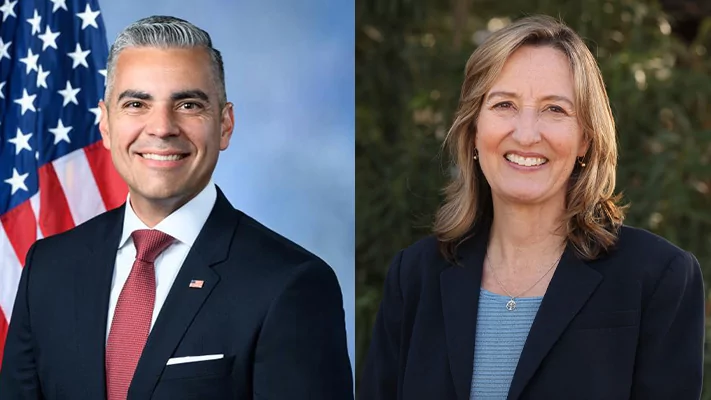
“I keep thinking that the general state of anxiety about the economy, and the southern border, and all that means for Arizona due to its perceived threats to personal safety, is going to win the day for Donald Trump,” said Barnes, who heads Phoenix-based Copper State Consulting Group.
Barnes also scoffed at efforts by the Harris-Walz ticket to shun their party’s liberal wing on immigration and move toward the center. For instance, Harris no longer speaks of rolling back what she long called restrictive Trump-era policies. The candidate instead frequently invokes her six years as California’s attorney general and local prosecutorial career before that, emphasizing the need to stop the flow of migrants, limit asylum, and fund more Border Patrol operations.
“I think it is transparently political,” Barnes said. “Trying to convince voters that you got religion on this very issue despite having an entire political resume on the other side of it isn’t likely to work.”
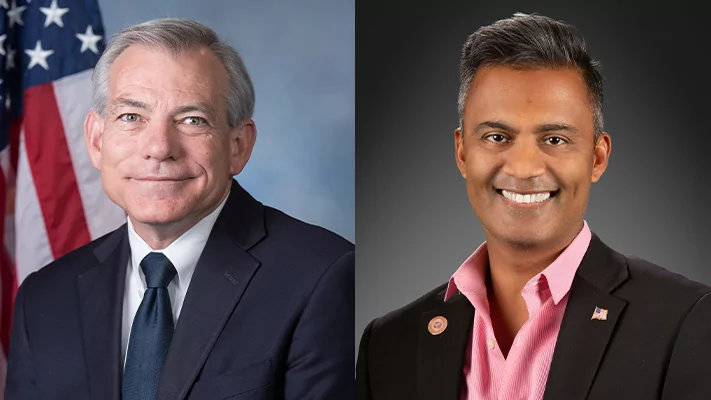
Harris faces another challenge that’s manifested itself nationally but is particularly acute in Arizona: a weakness in support from Latino men, per polls, said Lisa M. Sanchez, professor of government and public policy at the University of Arizona, who keeps a close eye on Grand Canyon State political trends.
“Here in Arizona, it’s been interesting to watch the role of candidate gender on the Latino electorate,” Sanchez said by email. “For many Latino men, the Harris campaign doesn’t have a place for them.”
Yet as the presidential race winds toward Election Day on Nov. 5, with early and mail-in voting in Arizona having already begun, there’s a solid argument for Harris having an edge. Even if it’s a relatively narrow advantage, said Rodd McLeod, a Democratic political consultant in Phoenix who has worked in more than 10 states.
“It’s a toss-up race, there’s no doubt about it,” McLeod said in an interview. However, “The MAGA brand just is not popular here.”
And in a state swarming with independent voters, Trump may have maxed out his support.
“In 2016, he kind of did to Democrats what we did to Republicans in 2020: turning out people who don’t usually vote,” McLeod said. “There’s a decent chance that he’s just not as good at that now.”
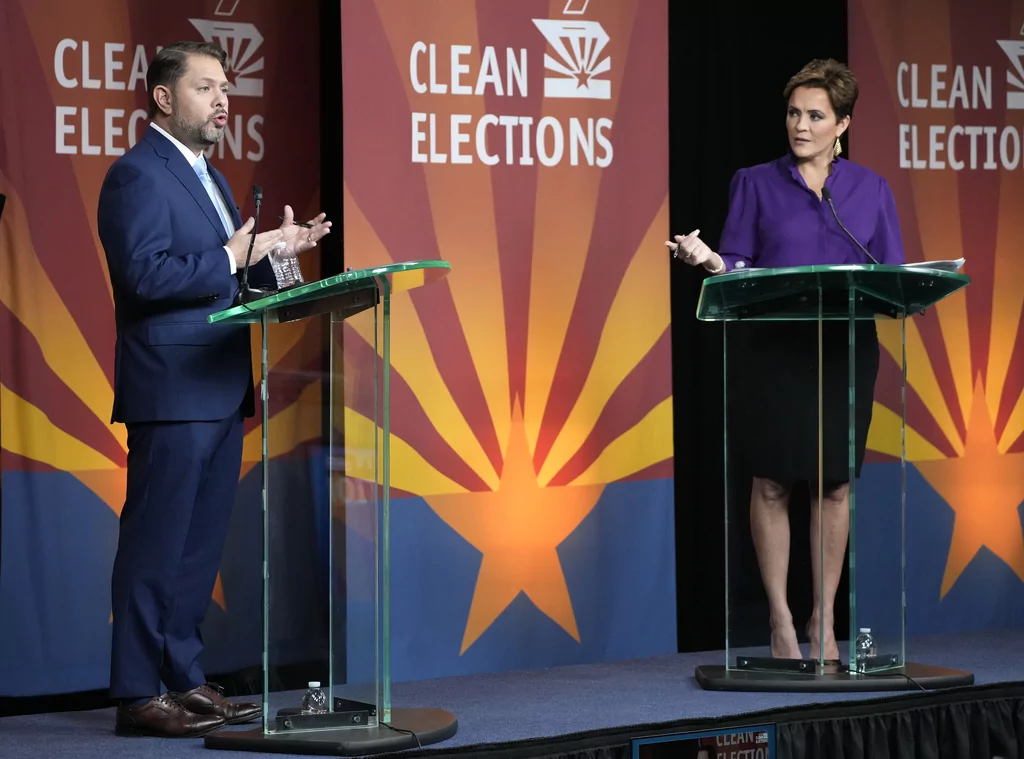
On immigration, widely considered Trump’s top issue, Arizona voters often have a more sophisticated view than they’re given credit for, said McLeod, a native New Yorker who has worked on Arizona campaigns since 2006.
“It’s hyped in a way that a lot of people see there’s a lot of bombastic rhetoric that doesn’t meet the reality,” McLeod said. “People want a solution to the problem. The feeling is that there are some bad people involved in human smuggling and drug smuggling, but cross-border trade is good. Mexico is our neighbor. This whole ‘invasion’ rhetoric is cooked up.”
To win Arizona, Harris must make the sale with the type of irregular voters McLeod mentioned.
“She’s got more room to grow because of the youth vote and the less routine voter,” Phoenix-based political consultant Chuck Coughlin said in an interview. “There’s a lot of enthusiasm among those groups. And the Harris campaign has a good ground game to reach them.”
Any number of factors could make a difference in which presidential candidate wins Arizona. For instance, many Arizonans faced big electricity rate hikes during the record-hot summer. Between the hotter weather and higher rates, the average residential Arizona Public Service customer is paying 16.4% more for electricity this summer, according to the electric utility provider.
Trump has seized on the matter, promising in several campaign stops in Arizona to slash AC and other energy bills — though his policy plans on how to do so are vague, to put it mildly. Rep. Ruben Gallego (D-AZ), the Democratic Senate nominee against Lake, recently called on the federal government to provide more resources to help vulnerable Arizonans pay their AC bills.
Lake makes waves, again
Arizona has an open Senate seat due to the retirement of Sen. Kyrsten Sinema (I-AZ). Once a rising Democratic star who was elected to both chambers of the state legislature and then a U.S. representative for six years, Sinema angered many Democratic colleagues by bucking the party on issues such as her support for a federal tax provision — critics call it a loophole — that allows private equity professionals and other wealthy investors to pay lower investment tax rates on compensation than salaried workers.
Sinema also has been a holdout against eliminating, or at least curtailing, the Senate filibuster. After being elected to the Senate as a Democrat in 2018, she became an independent four years later. Facing an uphill climb for reelection, she’s leaving public office.
Sinema’s longtime political nemesis, Gallego, is now favored in his race against Lake, the 2022 Republican gubernatorial nominee. Polls consistently show Gallego, once a House Progressive Caucus member who has since moved to the center, ahead of Lake.
That’s due in part to Gallego’s deft political maneuvering, Barnes said.
Gallego “is a liberal congressman who is dressing himself as a nonliberal congressman,” Barnes said with grudging admiration of the likely soon-to-be Democratic senator from Arizona.
Lake is now a well-known figure as a Trump-aligned former newscaster and vocal election denier about Biden’s 2020 win. In 2022, she bolstered her name recognition with tough-on-immigration views that drew national attention, as did her charisma on the stump, which she polished during 30 years in local TV.
Lake’s style, though, was highly polarizing, and she lost the 2022 gubernatorial race to Democratic rival Katie Hobbs 50.32% to 49.65%, or a bit over 17,000 votes out of nearly 2.6 million cast. Lake has since repeatedly contested the election results in court and lost at every step.
With polls showing Gallego likely to nab the Senate seat, Arizona has become a pleasant surprise for Democrats trying to hold their 51-49 majority in the chamber. While the Democratic Senate campaign arm and outside groups are spending in Arizona, their candidate’s strong chances of winning have freed up money for tight Senate races in Montana, Ohio, and elsewhere.
Lake, having lost her 2022 gubernatorial bid by a hair, had a chance to build on her support from nearly half the electorate. Instead, she sabotaged it with nearly two years of litigation trying, futilely, to change the result, McLeod said.
“You would think that’s not a bad starting point for a Senate race,” he said of the nearly half the vote Lake earned in her 2022 gubernatorial bid. “Then she went out and bought a crane and wrecking ball and started swinging at her image every day. Now Arizona voters think she’s a joke and don’t trust her.”
Shaky House foundations
Arizona is key to Democrats’ plans of overturning the House Republican majority after two years — and, conversely, GOP plans to keep it. The southeastern Arizona and eastern Tucson-area 6th Congressional District is a target for both sides.
In 2022, Republican Juan Ciscomani, defeated Democrat Kirsten Engel, a former legislator, 50.7% to 49.2%. The 6th Congressional District race was among the nation’s closest, even as Republicans underperformed nationally, nabbing a majority in the chamber by just a few seats. It’s among 18 House districts represented by Republicans that would have backed Biden over Trump in the 2020 presidential race. But Biden would have just barely come out ahead — 49.3% to 49.2%.
In the 2022 race, Ciscomani leaned heavily into his biography. Born in Mexico, he was the first member of his family to graduate from college. He later became a top adviser to then-Gov. Doug Ducey. Engel touted her status as a law professor with expertise in environmental issues — a useful credential for a House district where large swaths of land have suffered water shortages.
Engel is running again in 2024, and in the rematch, there’s a clear contrast between their platforms. The incumbent Republican is focusing on the economy and border security, while Engel has centered most of her appeal to voters on abortion, especially among Hispanic women.
A few hours and a hot desert drive north in the Phoenix area, Rep. David Schweikert (R-AZ) also finds himself in a tough reelection match. The northeastern Phoenix and Scottsdale 1st Congressional District would have backed Biden over Trump in 2020, 50.1% to 48.6%.
Schweikert first won a more conservative-leaning House seat in the 2010 Republican landslide. He gained national prominence as a fiscal hawk, condemning out-of-control spending by both parties and lamenting the crushing burden of ballooning deficits and national debt left to the nation’s future generations.
Schweikert has kept somewhat of a lower profile in recent years. In 2020, he admitted to 11 violations of House ethics rules, including undisclosed loans and campaign contributions; misuse of campaign funds for personal purposes; improper spending by his office; and an environment where office staffers were pressured to do political work.
In 2022, after redistricting made his district more competitive, Schweikert won by less than 1 percentage point. His Democratic rival this year, former state Rep. Amish Shah, is a surgeon, with high name recognition in the area. On the campaign trail, Shah has emphasized his bipartisan style in the legislature. He has billed himself as someone willing to break from his party on immigration, pledging to “secure our border.” Shah also is emphasizing abortion rights, an issue that’s expected to drive Democratic turnout this cycle amid GOP-led restrictions on the procedure.
Still, House incumbents are hard to beat. Ciscomani and Schweikert have both proven their political meddling in previous Republican primaries and general elections. The outcomes of both races could be similarly close to 2022, one way or another.
Statehouse up for grabs
Both chambers of the Republican-controlled state legislature are up for grabs, a sign of how much Arizona has changed politically. In 2010, Republicans held supermajorities in both legislative houses. They also controlled both Senate seats and every statewide office. Now the governor, secretary of state, and attorney general are Democrats. So is one senator, and Sinema still caucuses with Democrats and will likely soon be replaced by Gallego.
State House Republicans hold the narrowest of majorities, 31-29, over Democrats. It’s similar across the copper-domed Capitol in Phoenix, where Republicans hold a slim state Senate majority of 16-14.
Both chambers are up for grabs on Nov. 5, due in part to state legislative Republicans’ 2020 post-Election Day efforts to overturn Biden’s Arizona win. An unsuccessful “fake electors” scheme led to a state indictment of seven people connected to Trump’s 2020 presidential campaign, including his former chief of staff, Mark Meadows, and his former lawyer, Rudy Giuliani. Also indicted were 11 state Republican electors who claimed to the federal government that Arizona’s electoral votes had been won by Trump and not Biden.
Heading into Election Day 2024, Democrats have a chance at nabbing a majority in at least one legislative chamber.
“My gut is the state Senate is going to be at least tied, if not go the other way. It’s anybody’s guess in the House,” said Coughlin, the political consultant and CEO and president of HighGround.
Maricopa County elections officials
County office campaigns don’t usually draw attention like presidential races and Senate contests. But they’re vitally important, particularly in Maricopa County, where about 62% of Arizona’s population lives. Maricopa County, covering the broader Phoenix area, is home to nearly 4.5 million people, per the 2020 census, making it the fourth-most populous county in the United States.
In 2024, there are elections, with candidates listed by party, for, among other offices, county assessor, county attorney, and county sheriff. Each is nearly a dead heat, per an early September poll by Phoenix-based Noble Predictive Insights.
The open-seat race for county recorder has drawn the most attention. The Republican nominee, state Rep. Justin Heap, is running against Democrat Tim Stringham, an attorney and military veteran. Heap, a member of the Arizona House Freedom Caucus, beat incumbent Stephen Richer by 42% to 36% in the GOP primary in late July.
Richer had developed a national profile as the Maricopa elections administration to push back on Trump-fueled conspiracy theories about the 2020 and 2022 elections. The Republican primary was a microcosm of intra-GOP rifts between the predominant Trump wing of the party and the wounded, but still-breathing GOP establishment faction. After Richer’s primary loss, he was featured in a 60 Minutes episode. Heap has promoted legislation supported by election conspiracy theorists, though he’s avoided statements expressing direct support for election denialism.
Abortion ballot measure
Arizona activists qualified an abortion rights amendment in August following a battle over the state’s near-total abortion ban that made national headlines. In April, Arizona’s conservative Supreme Court upheld a Civil War-era law barring the procedure in virtually all cases. But the state’s Republican-run legislature voted to repeal the ban in May in the face of massive pressure. Despite that repeal, a separate GOP-backed law still bans abortion after 15 weeks of pregnancy, with no exceptions for rape or incest.
By contrast, Proposition 139 would guarantee abortion access until fetal viability, the point at which a fetus is said to be capable of surviving outside the womb. While there’s some disagreement among medical professionals as to when exactly that threshold is reached, it’s generally regarded as taking place at 22 to 24 weeks into pregnancy. Abortion would be allowed after fetal viability to protect a patient’s health.
A political ripple effect of Proposition 139 is that two conservative state Supreme Court justices who voted to uphold Arizona’s near-total abortion ban face retention elections in November. Fearful that they might lose, Republicans have placed another measure on the ballot that would retroactively eliminate almost all judicial elections.
Republican-backed ballot measures
Democrats aren’t the only ones to take advantage of Arizona’s ballot measure system. The 2024 ballot includes 11 state measures that the GOP-majority legislature added to circumvent Hobbs’s veto pen. The move came after years of Democrats using the ballot measure system to enact liberal laws in Arizona, by bypassing state legislators in the state capital of Phoenix, ranging from expanded social spending to gun control.
The most prominent GOP-backed ballot measure to pass this year would impose new penalties on illegal immigrants. Proposition 314 would make illegally crossing the border from Mexico a state crime, enabling state judges to order deportations. In addition, illegal immigrants who sell fentanyl that results in someone’s death or who use fraudulent documents to obtain work authorization or public benefits could face new felony charges.
Long-standing Supreme Court precedents give the federal government primacy when it comes to setting immigration laws. However, Republicans in other states have recently begun passing laws similar to the Arizona proposal in the hopes that the Supreme Court’s conservative majority will reverse those earlier cases. Notably, Proposition 314 contains a clause saying that it will only go into effect if the courts sign off on a nearly identical bill out of Texas.
Navigating a long ballot
It’s a much-overused cliché, but turnout determines close elections. And Arizona’s myriad of candidate and ballot choices means winners are likely to be determined by which side’s voters are more energized — or disgusted.
“There are enough voters for both sides to hit a home run on turnout,” said McLeod, the Democratic consultant. “It’s a matter of which side does a better job.”
The dwindling days until Nov. 5 are likely to produce a slew of polls. Nationally, but particularly in Arizona, it’s wise not to put too much faith in specific surveys and even polling averages, said Sanchez, the University of Arizona professor.
“Closely related to the sample quality is the difficulty associated with adequately sampling minority voters who are more difficult to reach and less likely to answer surveys,” Sanchez said. “In Arizona, this means sampling a sufficient number of Latino voters in each survey and focusing on sampling Latino voters that are emblematic of the broader Latino population in the state.”
Sanchez added, “Less experienced polling firms are more likely to include Latino voters with higher socioeconomic status — sometimes called ‘country club Latinos.’ While these Latino viewpoints are valid and important to include, they are not a close reflection of the general Latino demographic. The effect is skewed estimates that may not be reflective of the underlying support for each candidate.”
CLICK HERE TO READ MORE FROM THE WASHINGTON EXAMINER
Barnes, the Republican consultant, said the presidential candidates’ strengths and weaknesses make it hard to gauge who is ahead.
“Trump’s issue positions are majority positions in Arizona, but his personality is intolerable for a number of voters,” Barnes said. “Kamala Harris’s policy positions are to the left of most Arizonans by a long shot. But she’s reasonably well-liked personally. One of those things has to yield.”




